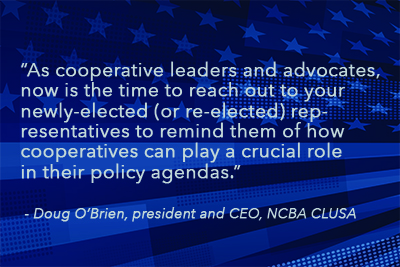 Last week’s election saw record turnout from voters determined to make their voices heard. As the dust settled, a couple of things became clear: first, this next set of policymakers face unprecedented policy challenges related to the economy, society and the environment; and second, the election results will require policymakers and stakeholders to work in a bipartisan way to get things done.
Last week’s election saw record turnout from voters determined to make their voices heard. As the dust settled, a couple of things became clear: first, this next set of policymakers face unprecedented policy challenges related to the economy, society and the environment; and second, the election results will require policymakers and stakeholders to work in a bipartisan way to get things done.
As a cooperative community, we are ready to work with our newly-elected and reelected leaders in this unprecedented moment and we will lift up cooperatives as a proven solution as policymakers work to respond to the health and economic impacts of the pandemic, build infrastructure, combat climate change and dismantle systemic racism.
As enterprises that put local people at the center of the business, cooperatives have proven successful in:
- addressing market failures where neither the private markets nor the government provided a needed service;
- helping small and marginalized firms gain parity with larger investor-owned competitors; and
- giving people a choice of enterprise to better meet their common needs and aspirations.
Whether looking to the nearly 20 million homes, businesses and schools powered by member-owned rural electric cooperatives or the more than 120 million members of credit unions, we know that cooperatives have the ability to go to scale and transform sectors and communities. This is especially true when policymakers create a level playing field for cooperatives and adopt policies that support people’s efforts to use the cooperative business model to empower themselves and their communities.
In October, NCBA CLUSA and the Cooperative Development Foundation released a policy paper authored by the Urban Institute. The report reflects conversations that took place during a series of 11 regional roundtables across the country, outlining the types of policies needed for people to capture the power of cooperatives, including:
- Ensure cooperatives are eligible for programs designed to assist businesses and communities;
- Provide financial support in the form of both grants and loans for co-ops to start and expand;
- Support robust technical assistance so that people can organize and establish cooperatives.
As cooperative leaders and advocates, now is the time to reach out to your newly-elected (or reelected) representatives to remind them of how cooperatives can play a crucial role in their policy agendas such as:
- Leveling the playing field for cooperative small businesses to access Small Business Administration financing opportunities
- Investing in caregiving co-ops led by Black, Latinx and Indigenous people to maintain affordability of services while capturing the profits
- Creating a small business retention program to support employees seeking to purchase businesses from retiring business owners or form purchasing cooperatives, and
- Expanding cooperative housing opportunities and support at the Department of Housing and Urban Development
Policymakers should also increase investments in cooperatives to advance America’s standing in the world and tackle the impacts of the COVID-19 pandemic as this disease will not disappear until it is mitigated everywhere. Programs embracing cooperatives at the U.S. Agency for International Development and U.S. Department of Agriculture have a successful track record of strengthening local economies by promoting enabling environments for cooperative business development, nutrition-led agriculture and creating opportunity for women and youth. NCBA CLUSA’s international development programs have helped start businesses that continue to thrive long after these projects end, and cooperatives have been a critical tool in helping countries graduate from U.S. foreign aid to self-reliance.
In the months and years to come, we look forward to broadening and deepening these efforts in partnership with the Biden Administration, the new Congress and other elected officials from state and local jurisdictions across America. Already, NCBA CLUSA has sent a transition document to the Biden Administration, and we will continue to reach out to their transition team in the months ahead.
—Doug O’Brien is president and CEO of NCBA CLUSA, where he works with the cooperative community to deepen its impact on the economy.


